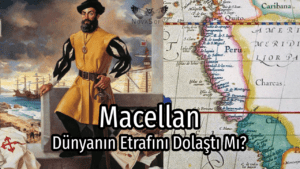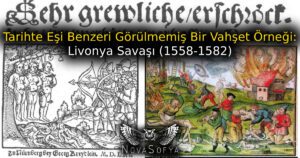The Naval Battle of Lepanto (Inebahty): Its Impact on European Literature

The Battle of Lepanto was a naval battle fought on 7 October 1571 between the Ottoman Empire and the Crusader alliance, which resulted in the defeat of the Ottomans. This battle is considered to be the greatest naval defeat in the period of the rise of the Ottoman Empire. What has been the impact of this war in Europe?
The impact of the Battle of Lepanto in Europe is significant both politically and culturally. Politically, this war shook the dominance of the Ottoman Empire in the Mediterranean and strengthened Spain, Venice and the Papal State, members of the Crusader alliance. With this war, the European states that opposed the Ottoman Empire’s conquest of Cyprus saw a hope to save Cyprus and began to act more courageously against the Ottomans. In addition, this war prevented the Ottoman Empire from advancing into Europe and contributed to the preservation of Europe’s Christian identity.
Culturally, this war created an atmosphere of triumph in Europe and inspired numerous works by Christian artists. For example, the Spanish writer Cervantes was wounded in the hand and chest in this battle and later mentioned this battle in his novel Don Quixote. In addition, the Italian painter Tintoretto made a painting about this war and exhibited it in the Vatican Palace at the request of Pope Pius V. With the impact of this war, an anti-Ottoman sense of nationalism also developed in Europe.

“They defied Italy up to its nose,
They roamed the Adriatic around the sea of the lion,
And the Pope threw out his arms for pain and loss,
And he invoked the kings of Christianity about swords for the Cross …
G.K. Chesterton (“Lepanto”)
The Battle of Lepanto also had a significant impact on European literature. The Spanish writer Miguel de Cervantes, who took part in this war and was wounded in his hand, reflected this experience in his famous novel Don Quixote. In addition, after the war, many poems, plays, epics and historiography emerged in Europe.
The Story of Cervantes in Lepanto
Cervantes

Cervantes was wounded twice in the chest and lost his left hand while serving in the galley Marquesa in this battle. For this reason, he was given the nickname “El Mancho Lepanto” (The Desertion of Inebahti). Cervantes was taken prisoner by the Algerian Turks while trying to return to Spain after the war and lived a life of captivity for five years. He was eventually saved by paying a ransom and returned to Spain. These experiences were also reflected in Cervantes’ literary works. In his novel Don Quixote, he told the story of a character who was a prisoner in Istanbul. He also expressed how important the Battle of Lepanto was to him: “I lost my left hand in this war, which is more precious to me than all the wealth of the whole world.”
Herrera’s Lepanto Poem
The poem Lepanto (1572) was written by the Spanish poet Fernando de Herrera. The poem praises the heroes of the war, Juan de Austria, Marcantonio Colonna and Sebastiano Venier.

In this poem, Herrera glorifies the victory of the Crusaders while claiming that the Ottomans were arrogant and tyrannical. The poem is originally in Spanish. Here is a part of the poem and its English equivalent:
“¡Oh gran felicidad de la cristiana
milicia! ¡Oh divino y alto hecho!
¡Oh claro honor de la católica grey!
¡Oh triunfo singular! ¡Oh gran provecho
de la fe! ¡Oh valor soberano
del invicto don Juan! ¡Oh nuevo Hector
de la Troya de Cristo! ¡Oh pecho fuerte,
que al fiero Otomano diste muerte!”
—-
“O great happiness of the Christian army! O divine and exalted work!
O brilliant honor of the Catholic flock! O unparalleled victory! O great gain of faith!
O supreme courage of the invincible Don Juan! O new Hector of Christ’s Troy!
O strong chest, you have given death to the savage Ottoman!”
Cinthio – La Battaglia Navale di Lepanto
The play La Battaglia Navale di Lepanto (1572) was written by Italian writer Giovanni Battista Giraldi Cinthio. The game describes the causes and consequences of the war.

The play is a dramatic adaptation of a work of history written by Cinthio based on his own observations. The main characters of the game include Pope Pius V, King Philip II of Spain, Duke of Venice, and Ottoman Sultan Selim II. While the play tells the causes, preparations and consequences of the war, it also reflects the political and cultural conflicts of the period. The play is one of Cinthio’s most famous works and is an important example of 16th-century Italian theatre.
Ronsard – Lepanto
The epic Lepanto (1575) was written by the French poet Pierre de Ronsard. The epic emphasizes the importance of the war and the victory of the Crusaders.

Ronsard is one of the most important French poets of the 16th century. He is known as the leader of the Pleiade group, which tried to create a new French literature inspired by Greek and Roman literature during the Renaissance. He wrote poems in an idyllic style that dealt with themes such as love, youth, nature and death.
One of Ronsard’s most famous works is Lepanto. This work is about the Naval Battle of Lepanto between the Ottoman Empire and the Holy Alliance in 1571. Ronsard wrote an epic celebrating the victory of the Holy Alliance in this war and praising Christian unity against the Ottomans.
Lepanto is a long poem consisting of 12 parts. Each chapter describes a different aspect of the war. Ronsard enthusiastically describes the historical background of the war, its heroes, strategies, battles and consequences. Mythological and astrological elements are also used in the poem.
Ronsard’s Lepanto has an important place in French literature. The poem shows Ronsard’s patriotism, religious sensibility and artistic talent. It also bears witness to one of the greatest naval battles in European history.
Knolles – The History of the Battle of Lepanto
The historiography The History of the Battle of Lepanto was written by the British historian Richard Knolles. In historiography, the details of the war and the reasons for the defeat of the Ottomans are described.

Knolles The History of the Battle of Lepanto. Its author, Richard Knolles, is a British historian and translator. This work, published in 1603, is the first English book written on Turkish civilization. It tells the history, culture, politics and military achievements of the Ottoman Empire by using various sources.
Knolles’ work is an important source, both historically and literarily. The work depicts the Ottoman Empire as both barbaric and cruel, as well as successful and disciplined. The narration of the work is also very fluent and exciting. Among the influences of the work are famous writers such as Shakespeare and Lord Byron.
The impact of the Naval Battle of Lepanto on European literature is not limited to these works. The traces of the war can be seen in many literary works in later periods. For example, in William Shakespeare’s play Othello (1603), the protagonist Othello is said to have killed an Ottoman commander. This indicates that Othello took part in the Naval Battle of Inebahti.
The Battle of Lepanto is an important event both historically and literarily. This war shaped the relations between the Ottoman Empire and Europe and also inspired European literature.
As a result, the impact of the Lepanto Naval Battle in Europe broke the supremacy of the Ottoman Empire in the Mediterranean, increasing the confidence of European states and reflected in Christian art and literature. This war also led to a change in relations between the Ottoman Empire and the European states.



